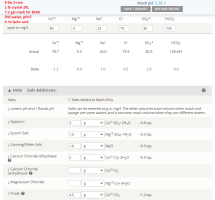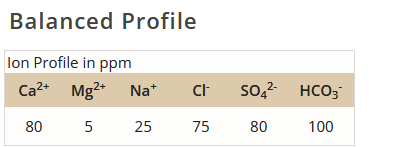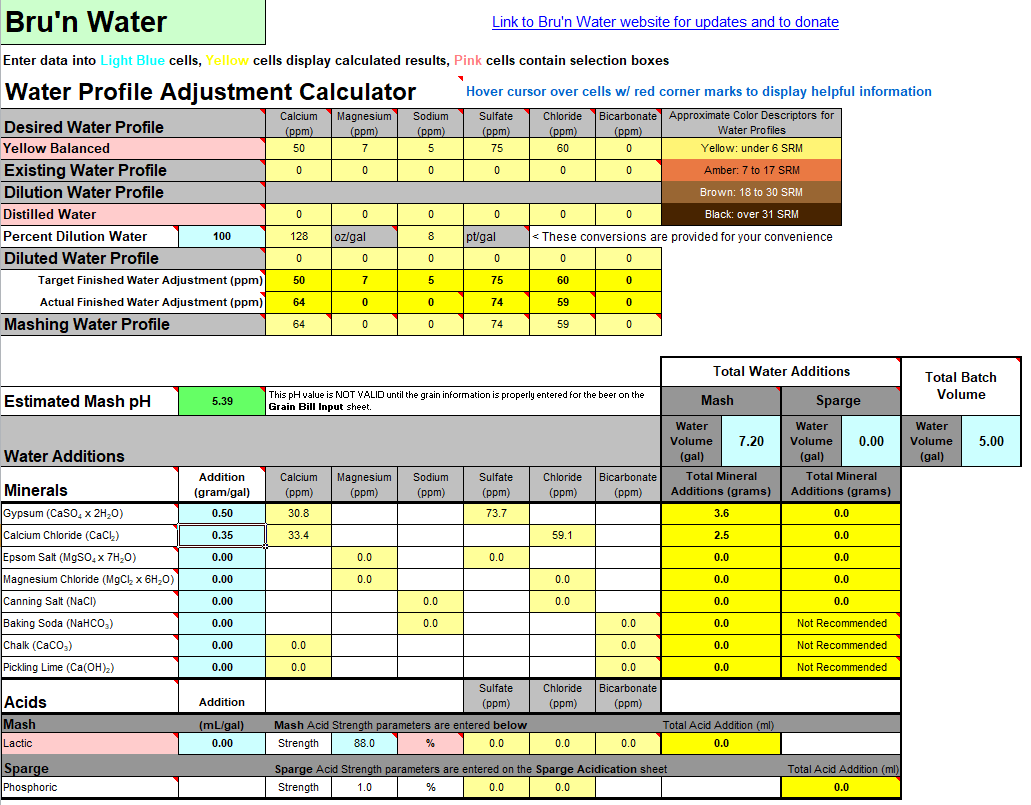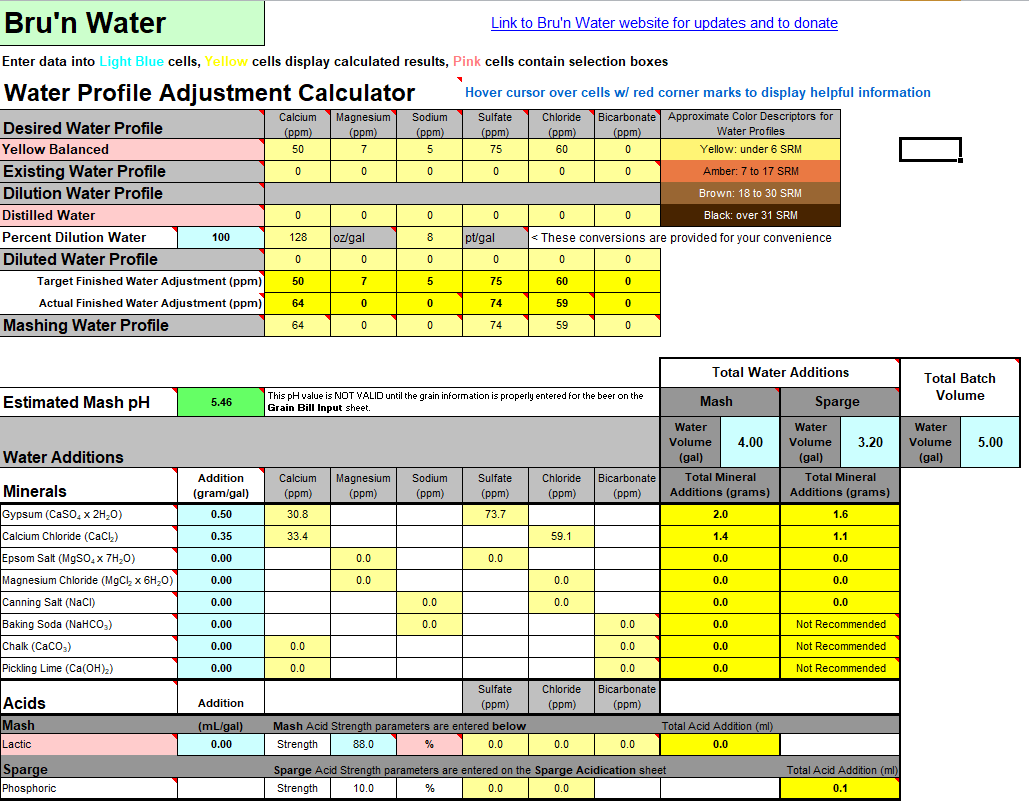There is so much information on water chemistry that I am almost reluctant to ask these questions. I am a technically-minded person but am not a chemist so I appreciate your patience.
Here is where I am with the hobby, and where I am trying to go. I am currently using the BIAB method and have optimized my setup to produce about 75% kettle efficiency. I produce a handful of beer styles that I enjoy. I have family members who enjoy my beer depending on the style and their palate. I would like to improve the taste of my beer to get from "yeah this is good" to "wow this is spectacular". I have cold-crashed and gelatin-fined the last few batches and this has improved the clarity of my beers but of course those processes do not really affect flavor (except perhaps perceived flavor, which is a different topic).
I am on city water and I have never liked its taste. The fridge filter makes it drinkable for me, but even that filtered water is not great. This leads me to believe my first step at improving the flavor of my brews would be improve the water. I could use Campden for the chlorine smell and then other adjuncts to balance the salts, but this seems like putting lipstick on a pig. I am thinking, garbage-in-garbage-out. I am not interested in the time or expense or maintenance of an RO system, or the cost and time needed to distill my own water. I can purchase distilled water for just under a buck a gallon and since I need less than 8 gallons, I figure this might be a well spent 8 bucks per batch.
I use BrewersFriend and have been experimenting with creating a "balanced profile" (using their definition of balanced) from DW. I used a "test" grist bill with 9 lbs brewers 2-row and 1 lb crystal 20L and 7.2 gallons of water to be treated. I was surprised by the adjuncts that seem to be needed to reach the balanced profile. It's just under 13 grams total of adjuncts which to my non-chemist brain sounds like way too little to make much of a difference. See screenshot. (Since one of my other other hobbies is reloading ammunition, I can use my powder scale to very accurately measure the adjuncts.) Not shown is 4 ml of lactic acid to produce estimated mash ph close to 5.4.
Finally, to my questions.
1) Is it reasonable to assume that since I don't like the taste of my water that I would improve my beers by using DW and adjuncts to achieve a water profile to match the style of beer I am brewing?
2) Am I on target or way off with the listed adjuncts to get DW to the "balanced profile" on BrewersFriend? I am somewhat confused here because I have read so many posts that say, "I never use baking soda" but I see no other reasonable way to get the HCO3 number even close.
3) Are the profiles on BrewersFriend reasonable? (I think I would only used Balanced, Light colored and hoppy, Pilsner, and Altbier)
4) If those profiles are not reasonable, what resource is available for reasonable profiles?
5) Within a profile, is there an adjunct or a ratio that is more important than the others? (either most important in producing a good beer or most likely to ruin a batch)
6) Is there something am I missing?
Thanks in advance.
Here is where I am with the hobby, and where I am trying to go. I am currently using the BIAB method and have optimized my setup to produce about 75% kettle efficiency. I produce a handful of beer styles that I enjoy. I have family members who enjoy my beer depending on the style and their palate. I would like to improve the taste of my beer to get from "yeah this is good" to "wow this is spectacular". I have cold-crashed and gelatin-fined the last few batches and this has improved the clarity of my beers but of course those processes do not really affect flavor (except perhaps perceived flavor, which is a different topic).
I am on city water and I have never liked its taste. The fridge filter makes it drinkable for me, but even that filtered water is not great. This leads me to believe my first step at improving the flavor of my brews would be improve the water. I could use Campden for the chlorine smell and then other adjuncts to balance the salts, but this seems like putting lipstick on a pig. I am thinking, garbage-in-garbage-out. I am not interested in the time or expense or maintenance of an RO system, or the cost and time needed to distill my own water. I can purchase distilled water for just under a buck a gallon and since I need less than 8 gallons, I figure this might be a well spent 8 bucks per batch.
I use BrewersFriend and have been experimenting with creating a "balanced profile" (using their definition of balanced) from DW. I used a "test" grist bill with 9 lbs brewers 2-row and 1 lb crystal 20L and 7.2 gallons of water to be treated. I was surprised by the adjuncts that seem to be needed to reach the balanced profile. It's just under 13 grams total of adjuncts which to my non-chemist brain sounds like way too little to make much of a difference. See screenshot. (Since one of my other other hobbies is reloading ammunition, I can use my powder scale to very accurately measure the adjuncts.) Not shown is 4 ml of lactic acid to produce estimated mash ph close to 5.4.
Finally, to my questions.
1) Is it reasonable to assume that since I don't like the taste of my water that I would improve my beers by using DW and adjuncts to achieve a water profile to match the style of beer I am brewing?
2) Am I on target or way off with the listed adjuncts to get DW to the "balanced profile" on BrewersFriend? I am somewhat confused here because I have read so many posts that say, "I never use baking soda" but I see no other reasonable way to get the HCO3 number even close.
3) Are the profiles on BrewersFriend reasonable? (I think I would only used Balanced, Light colored and hoppy, Pilsner, and Altbier)
4) If those profiles are not reasonable, what resource is available for reasonable profiles?
5) Within a profile, is there an adjunct or a ratio that is more important than the others? (either most important in producing a good beer or most likely to ruin a batch)
6) Is there something am I missing?
Thanks in advance.






